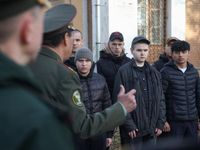On April 1, 2025, Russia initiated a significant conscription drive aimed at enlisting 160,000 military-age men between 18 and 30 years old. This marks the largest call-up since 2011 and is part of a broader strategy to expand the armed forces to 2.5 million personnel, fulfilling a presidential decree issued last year. As the conflict in Ukraine enters a critical phase, the urgency of this conscription is palpable, with many young men, like 21-year-old Bogdan from the outskirts of Moscow, feeling anxious about their futures.
"I received a summons to be drafted in the spring of 2024, despite my hypertension. By autumn, the police were searching for me to forcibly conscript me," Bogdan recounted in an interview with Al Jazeera, requesting anonymity due to fears of reprisal. Currently, he is hiding from authorities, hoping to register for military service in Saint Petersburg where he believes he might receive an exemption based on his medical condition.
Rights advocates have noted that the loopholes previously available for avoiding conscription are tightening. Ivan Chuviliaev, a spokesman for the organization Go By The Forest, explained that a year ago, the age limit for conscription was raised, now including young men up to 30 years old, while previously it was capped at 27. Furthermore, the draft boards are now issuing summonses that remain valid for an entire year, complicating the process for those trying to evade the draft.
Chuviliaev also highlighted that the list of medical conditions exempting individuals from military service is being revised, allowing more individuals to be classified as fit for duty. "This is simply an artificial creation of chaos, so that doctors will stamp Category A fitness for everyone without bothering to dig through their papers," he stated. New sanctions, such as bans on loans and leaving the country, are being imposed on those who fail to respond to summonses, adding to the pressure on young men.
According to an open-source tally compiled by the BBC and independent Russian outlet Mediazona, over 100,000 Russian soldiers have been killed since the onset of the conflict in 2022, a staggering figure that weighs heavily on the minds of potential conscripts. Oleg Ignatov, a senior analyst at Crisis Group, noted that while conscripts are not supposed to be deployed directly to the front lines, they can be stationed in regions bordering Ukraine, such as Belgorod and Kursk, where they could inadvertently become involved in combat operations.
Moreover, incidents have been reported where conscripts were forced to sign contracts under duress. In a recent case from Chelyabinsk, local prosecutors found that at least 13 conscripts had contracts signed illegally on their behalf. Mikhail Liberov from the Conscientious Objectors’ Movement remarked that while the chance of a conscript actually seeing combat is low, the possibility remains that they could be coerced into signing a contract and sent to the front lines.
For many young men, evading military service is a complex endeavor. Legal options include claiming health issues, pursuing higher education, or applying for alternative civil service roles. However, these routes often require proactive measures, such as submitting documentation to draft offices, which can be daunting and fraught with complications. Liberov emphasized that educational deferrals only postpone the inevitable for many young men, who will eventually face the same issues as they reach the ages of 22 and 24.
As the conflict persists, the recruitment of foreign nationals has also become a significant aspect of the war. Recently, two alleged Chinese nationals, Wang Guangjung, 34, and Zhang Renbo, 27, were captured in Ukraine for fighting alongside Russian forces. They claimed to have been deceived by enticing social media advertisements promising lucrative salaries in the Russian military.
Wang shared his experience, stating, "I was flipping through TikTok when I saw an advertisement to join the Russian army. After losing my job last summer, I was drawn to the offer, especially since military service is seen as prestigious in China." He was promised a salary of 200,000 to 250,000 Russian rubles (approximately $2,000 to $3,000) per month, significantly higher than the average wage in China. However, upon enlisting, he found that the promised payments never materialized, as his bank card and mobile phone were taken by Russian authorities.
Zhang, who had initially moved to Russia for work in construction, also enlisted and was deployed to the frontlines. Both men reported encountering foreign fighters from various countries, including Central Asia and Iraq, while serving in the Russian military. They emphasized that their decision to join the army was voluntary and that the Chinese government had no involvement in their enlistment.
Ukrainian President Volodymyr Zelensky has claimed that several hundred Chinese citizens are currently fighting on Russia’s side, with intelligence reports indicating that at least 155 Chinese nationals are actively involved. Zelensky warned that these incidents are not isolated, but part of a systematic effort by Russia to recruit Chinese citizens through social media.
The Chinese government has denied any state involvement in the recruitment of its citizens, with foreign ministry spokesperson Lin Jian labeling Zelensky’s assertions as “groundless.” He reiterated China’s neutral stance in the conflict and urged its citizens to avoid conflict zones.
As the war continues, the recruitment of foreign nationals remains a contentious issue, with both Russia and Ukraine relying on individuals from abroad to bolster their military efforts. Reports have surfaced of North Korean, Indian, Nepali, and Cuban nationals also being recruited to fight for Russia, often under dubious circumstances. The presence of these foreign fighters complicates the geopolitical landscape, potentially straining relations between Russia and countries whose citizens are being recruited.
In summary, as Russia ramps up its conscription efforts and foreign nationals become increasingly involved in the conflict, the implications for both the individuals caught in this turmoil and the broader geopolitical situation remain profound. The ongoing war not only reshapes the lives of those directly involved but also impacts international relations and perceptions of military engagement across the globe.





